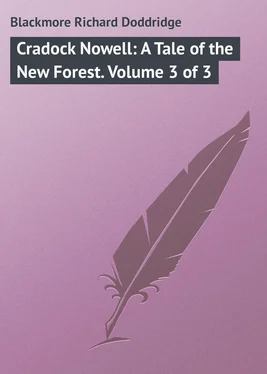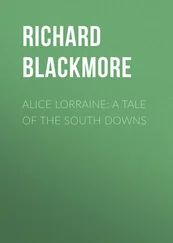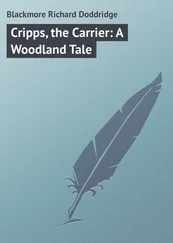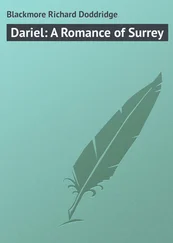Richard Blackmore - Cradock Nowell - A Tale of the New Forest. Volume 3 of 3
Здесь есть возможность читать онлайн «Richard Blackmore - Cradock Nowell - A Tale of the New Forest. Volume 3 of 3» — ознакомительный отрывок электронной книги совершенно бесплатно, а после прочтения отрывка купить полную версию. В некоторых случаях можно слушать аудио, скачать через торрент в формате fb2 и присутствует краткое содержание. Жанр: foreign_prose, на английском языке. Описание произведения, (предисловие) а так же отзывы посетителей доступны на портале библиотеки ЛибКат.
- Название:Cradock Nowell: A Tale of the New Forest. Volume 3 of 3
- Автор:
- Жанр:
- Год:неизвестен
- ISBN:нет данных
- Рейтинг книги:3 / 5. Голосов: 1
-
Избранное:Добавить в избранное
- Отзывы:
-
Ваша оценка:
- 60
- 1
- 2
- 3
- 4
- 5
Cradock Nowell: A Tale of the New Forest. Volume 3 of 3: краткое содержание, описание и аннотация
Предлагаем к чтению аннотацию, описание, краткое содержание или предисловие (зависит от того, что написал сам автор книги «Cradock Nowell: A Tale of the New Forest. Volume 3 of 3»). Если вы не нашли необходимую информацию о книге — напишите в комментариях, мы постараемся отыскать её.
Cradock Nowell: A Tale of the New Forest. Volume 3 of 3 — читать онлайн ознакомительный отрывок
Ниже представлен текст книги, разбитый по страницам. Система сохранения места последней прочитанной страницы, позволяет с удобством читать онлайн бесплатно книгу «Cradock Nowell: A Tale of the New Forest. Volume 3 of 3», без необходимости каждый раз заново искать на чём Вы остановились. Поставьте закладку, и сможете в любой момент перейти на страницу, на которой закончили чтение.
Интервал:
Закладка:
Pondering thus, he followed the green track as far as the corner of the coppice hedge, and then he sat down on a mossy log, and began to chew more pleasantly. He had washed his hands at a little spring, and gathered a bit of watercress, and fixed his square of cold bacon cleverly into a mighty hunk of brown bread, like a whetstone in its socket; and truly it would have whetted any plain manʼs appetite to see the way he sliced it, and the intense appreciation.
With his mighty clasp–knife (straight, not curved like a gardenerʼs) he cut little streaky slips along, and laid each on a good thickness of crust, and patted it like a piece of butter, then fondly looked at it for a moment, then popped it in, with the resolution that the next should be a still better one, supposing such excellence possible. And all the while he rolled his tongue so, and smacked his lips so fervently, that you saw the man knew what he was about, dealt kindly with his hunger, and felt a good dinner – when he got it.
“There, Scratch,” he cried to his dog, after giving him many a taste, off and on, as in fairness should be mentioned; “hie in, and seek it there, lad.”
With that he tossed well in over the hedge – for he was proud of his dogʼs abilities – the main bone of the three (summum bonum from a canine point of view; and, after all, perhaps they are right), and the flat bone fell, it may be a rod or so, inside the fence of the coppice. Scratch went through the hedge in no time, having watched the course of the bone in air (as a cricketer does of the ball, or an astronomer of a comet) with his sweet little tail on the quiver. But Scratch, in the coppice, was all abroad, although he had measured the distance; and the reason was very simple – the bone was high up in the fork of a bush, and there it would stay till the wind blew. Now this apotheosis of the bone to the terrier was not proven; his views were low and practical; and he rushed (as all we earth–men do) to a lowering conclusion. The bone must have sunk into ĕraʼs bosom, being very sharp at one end, and heavy at the other. The only plan was to scratch for it, within a limited area; and why was he called “Scratch,” but for scarifying genius?
Therefore that dog set to work, in a manner highly praiseworthy (save, indeed, upon a flowerbed). First he wrought well with his fore–feet, using them at a trot only, until he had scooped out a little hole, about the size of a ratʼs nest. This he did in several places, and with sound assurance, but a purely illusory bonus. Presently he began in earnest, as if he had smelled a rat; he put out his tongue and pricked his ears, and worked away at full gallop, all four feet at once, in a fashion known only to terriers. Jem came through the hedge to see what it was, for the little dog gave short barks now and then, as if he were in a rabbit–hole, with the coney round the corner.
“Mun there, mun, lad; show whutt thee carnst do, boy.”
Thus encouraged, Scratch went on, emulative of self–burial, throwing the soft earth high in the air, and making a sort of laughing noise in the rapture of his glory.
After a while he sniffed hard in the hole, and then rested, and then again at it. The master also was beginning to share the little dogʼs excitement, for he had never seen Scratch dig so hard before, and his mind was wavering betwixt the hope of a pot of money, and the fear of finding the skeleton belonging to the ghost.
Scratch worked for at least a quarter of an hour, and then ran to the ditch and lapped a little, and came back to work again, while Jem stood by at a prudent distance, and puffed his pipe commensurately, and wished he had somebody with him. Presently he saw something shining in the peaty and sandy trough, about two feet from the surface, something at which Scratch tried his teeth, but found the subject ungenial. So Jem ran up, making sure this time that it was the pot of money. Alas, it was nothing of the sort, nothing at all worth digging for. Jem was so bitterly disappointed that he laid hold of Scratch, and cuffed him well, and the little dog went away and howled, and looked at his bleeding claws, and stood penitent, with his tail down.
Nevertheless, the thing dug up had cost some money in its time, for gunmakers know the way to charge, if never another soul does. It was a pair of gun–barrels, without any stock, or lock, or ramrod, heavily battered and marked with fire, as if an attempt had been made to burn the entire implement, and then, the wood being consumed, the iron parts had been kicked asunder, and the hot barrels fiercely trampled on. Now Jem knew nothing whatever of guns, except that they were apt to go off, whether loaded or unloaded; so after much ponderous thinking and fearing — fiat experimentum in corpore vili – he summoned poor Scratch, and coaxed him, and said, “Hie, boy, vetch thic thur thinʼ!”
When he found that the little dog took the barrels in his mouth without being hurt by them, and then dragged them along the ground, inasmuch as he could not carry them, Jem plucked up courage and laid them by, to take them home that evening.
After his bit of supper that night, Jem and his wife held counsel, the result of which was that he took his prize down to Roger Sweetlandʼs shop, at the lower end of the village. There he found the blacksmith and one apprentice working overtime, repairing a harrow, which must be ready for Farmer Blackers next morning. The worthy Vulcan received Jem kindly, for his wife was Jemʼs wifeʼs second cousin; and then he blew up a sharp yellow fire, and examined the barrels attentively.
“Niver zeed no goon the likes o’ thissom, though a ‘ave ‘eered say as they makes ‘em now to shut out o’ tʼother end, man. Whai, her hanʼt gat niver na brichinʼ! A must shut the man as shuts wiʼ her.”
“What wull e’ gie vor un, Roger? Her bainʼt na gude to ussen.”
“Gie thee a zhillinʼ, lad, mare nor her be worth, onʼy to bate up vor harse–shoon.”
After vainly attempting to get eightee–pence, Jem was fain to accept the shilling; and this piece of beautiful workmanship, and admirable “Damascus twist,” was set in the corner behind the door, to be forged into shoes for a cart–horse. So, as Sophocles well observes, all things come round with the rolling years: the best gun–barrels used to be made of the stub–nails and the horse–shoes (though the thing was a superstition); now good horse–shoes shall be made out of the best gun–barrels.
But, in despite of this law of nature, those gun–barrels never were made into horse–shoes at all, and for this simple reason: – Rufus Hutton came over from Nowelhurst to have his Polly shodden; meanwhile he would walk up to the Hall, and see how his child Eoa was. It is a most worshipful providence, and as clever as the works of a watch, that all the people who have been far abroad, whether in hot or cold climates (I mean, of course, respectively, and not that a Melville Bay harpooner would fluke in with a Ceylon rifleman), somehow or other, when they come home, groove into, and dovetail with, one another; and not only feel a pudor not to contradict a brother alien, but feel bound by a sacramentum to back up the lies of each other. To this rule of course there are some exceptions (explosive accidents in the Times , for instance), but almost every one will admit that it is a rule; just as it is not to tell out of school.
As regards Rufus and Eoa, this association was limited (as all of them are now–a–days, except in their powers of swindling), strictly limited to a keen and spicily patriarchal turn. Eoa, somehow or other, with that wonderful feminine instinct (which is far in advance of the canine, but not a whit less jealous) felt that Rue Hutton had admired her, though he was old enough to be her grandfather in those precocious climates. And though she would not have had him, if he had come out of Golconda mine, one stalactite of diamonds, she really never could see that Rosa had any business with him. Therefore, on no account would she go to Geopharmacy Lodge, and she regarded the baby, impending there, as an outrage and an upstart.
Читать дальшеИнтервал:
Закладка:
Похожие книги на «Cradock Nowell: A Tale of the New Forest. Volume 3 of 3»
Представляем Вашему вниманию похожие книги на «Cradock Nowell: A Tale of the New Forest. Volume 3 of 3» списком для выбора. Мы отобрали схожую по названию и смыслу литературу в надежде предоставить читателям больше вариантов отыскать новые, интересные, ещё непрочитанные произведения.
Обсуждение, отзывы о книге «Cradock Nowell: A Tale of the New Forest. Volume 3 of 3» и просто собственные мнения читателей. Оставьте ваши комментарии, напишите, что Вы думаете о произведении, его смысле или главных героях. Укажите что конкретно понравилось, а что нет, и почему Вы так считаете.












